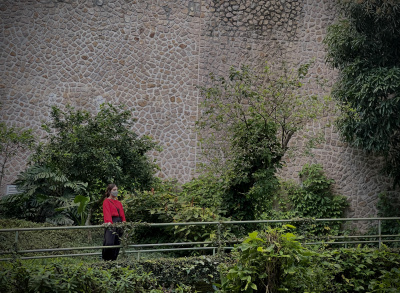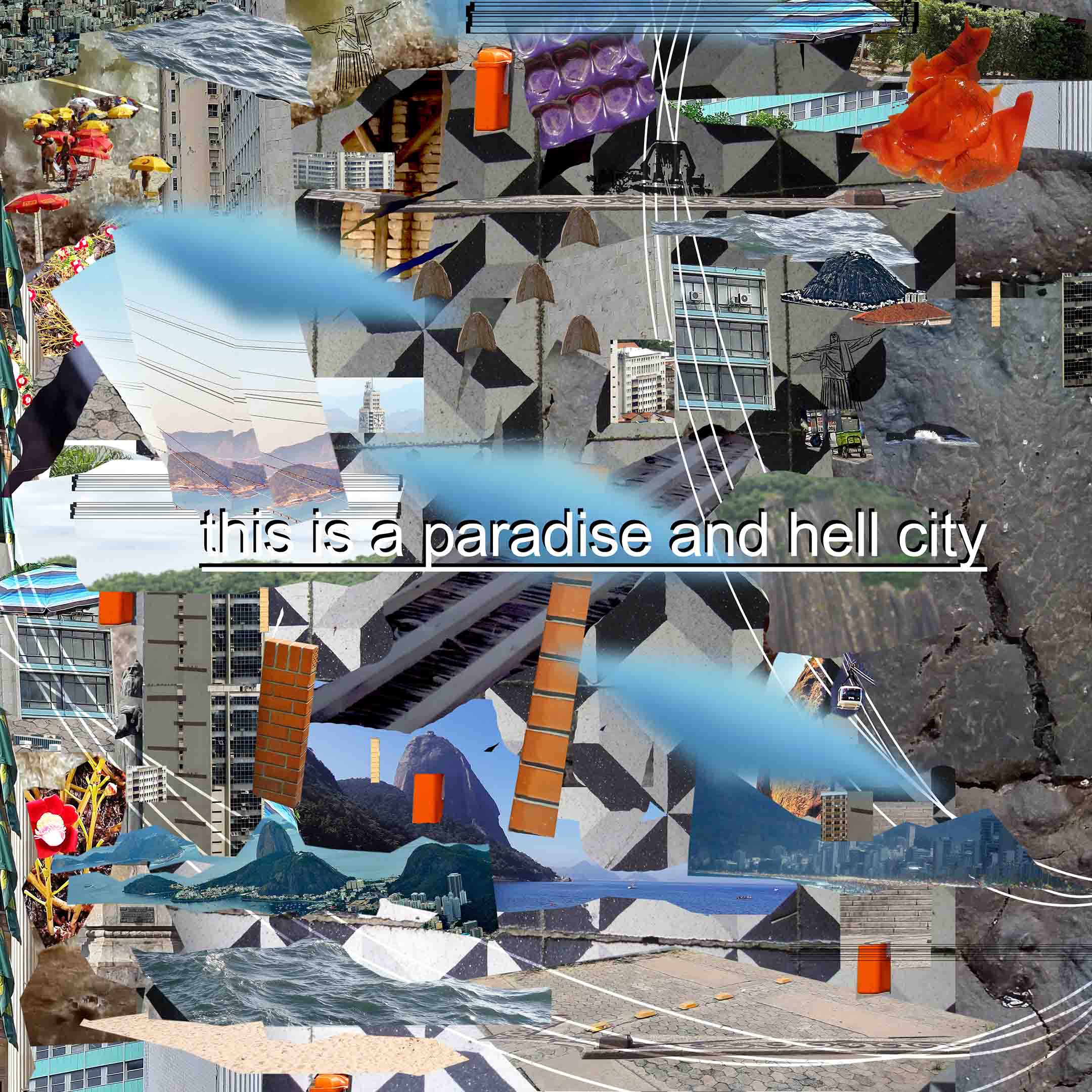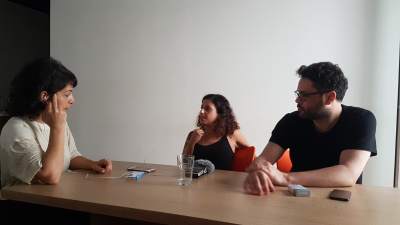Staying Creative Between Beauty and Chaos in Rio de Janeiro
Episode 5 of the TIMEZONES podcast series, co-initiated and co-produced by Norient and the Goethe-Institut. This episode explores how Rio has shaped its music over the centuries and invented its future through the vision of artists, creators, and scholars.
«Samba was persecuted, it was a source of embarrassment for a lot of rich, wealthy, Eurocentric Brazilians, but in many ways, it won out. So a lot of the urban spaces that were designed to keep out Black Brazilians and poor Brazilians became the spaces that are now used for street ‹blocos› (carnival blocks) that are now central to grassroots samba during carnival.»
Bruno Carvalho
Behind the picture-postcard landscapes and the stereotypical images of carnival, beaches, and beautiful women lies an enigmatic and broken city: Rio de Janeiro. Rio’s musical and creative identity, such as samba and carnival, seems to be ever transforming and flirting with traditional forms, yet at the same time, those forms have a history of struggle, intimately connected to Afro-Brazilian musical and religious expressions. In a challenging historical moment of crisis, a pandemic and political ruthlessness, artists in Rio are integrating those identities with the most immediate needs and perceptions of reality. The goal is to stay alive, sane, and, most of all, creative.
A podcast by Vivian Caccuri
Co-initiated and co-produced by Norient and the Goethe-Institut
Featuring: Thiago Lanis, Domingos Guimaraens and Ynaiê Dawson (Opavivará), Cabelo Cobral Coral, Thaís Delgado, Bruno Carvalho, Sabrina Fidalgo
Director, Idea, Interviews: Vivian Caccuri
Music: Vivian Caccuri, Thiago Lanis
Additional Samples: Opavivará, MC Bruna Alves, MC Don Juan
Editing: Vivian Caccuri
Artistic Editor: Svetlana Maraš
Project Management: Hannes Liechti
Jingle Voiceover: Nana Akosua Hanson
Jingle Mix: Daniel Jakob
Mastering: Adi Flück, Centraldubs
Artwork: Šejma Fere
→ Full transcript of episode 5
Listen On



→ Listen to further TIMEZONES episodes
Featured Artists
Thiago Lanis is a model as well as a self-taught singer and composer born in Arará, a favela in Northern Rio. Having loved samba, Brazilian popular music and international pop all his life, Thiago uses bass-loaded and delicate rhythmic sounds as his main inspirations and materials for his creations. Thiago is a composer at Estúdio OSSO, a film score studio in Rio de Janeiro.
Opavivará is an art collective from Rio de Janeiro that develops actions in public spaces all over the city, in galleries, and in cultural institutions, proposing inversions in the use of urban space through the creation of relational devices that provide collective experiences. Since its creation in 2005, the group has been actively participating in the Brazilian contemporary art scene.
Cabelo Cobral Coral is a Brazilian artist who lives and works in Rio de Janeiro. Cabelo is a poet, musician, and visual artist. He considers his drawings, paintings, sculptures, songs, performances, videos, and processes of instaurations as manifestations of poetry. He is currently working on the ongoing project «Luz com Trevas»: an exhibition, a show, and a disc that, mixed together, form one single work.
Thaís Delgado is a fashion designer based in Rio de Janeiro and the owner of VERKKO, a brand founded in 2015 that is inspired by her own subjective universe, memories, feelings, and understanding of her context as an Afro-Diasporic woman.
Bruno Carvalho is a professor of literature at Harvard University. He works on cities as lived and imagined spaces and studies relationships between cultural practices and urbanisation with a focus on Brazil. Carvalho’s interdisciplinary approaches bridge history, literary analysis, and urban studies. A Rio de Janeiro native, Carvalho received his Ph.D. from Harvard University (2009) and was a faculty member at Princeton University (2009–2018).
Sabrina Fidalgo is an award-winning Brazilian filmmaker. Her films have been showcased at over 300 national and international film festivals. She studied at the University of Television and Film (HFF) in Munich, Germany, and also studied screenwriting through ABC Guionístas at the University of Cordoba, Spain.
Bonus Talk

Grabbing for a Worldview in Rio de Janeiro
moderated and produced by Daniel Limaverde
The evening Daniel Limaverde first met fellow sound artist Vivian Caccuri was spent in total silence, walking into the night on Rio de Janeiro’s empty streets and neighborhoods for eight hours, accompanied by a group of fifteen silent locals. This activity, proposed by Vivian’s «silent walk» series, spontaneously reveals the sounds of a city, tattooing an indelible impression on the aural awareness of its inhabitants.
In this Bonus Talk, Daniel Limaverde interviewed Vivian Caccuri over the course of a day in the city. While walking around her neighborhood, they reflected on Rio de Janeiro’s social, environmental, and political worldviews and the narratives that feed back into Brazilian society – and outwards into the rest of the world. They also discuss the making of Vivian’s TIMEZONES episode and how her previous body of work in building sound systems and conducting «silent walks» delineates this podcast production.
Daniel Limaverde is a music composer, sound artist, and nonfiction audio producer from Rio de Janeiro. He is the founder of the Brazilian podcast boutique Mafuá Audio and host of the nonfiction narrative show Palimpsesto, which investigates themes of Brazilian culture and society by tracing back multiple historical threads. As a musician, Limaverde has participated in international exchanges with Japan (Red Bull Music Academy) and the United States (OneBeat). He also works as a music producer for performing artists, composes soundtracks for cinema, TV shows and podcasts and creates sound art installations.
Playlist
Explore a playlist of artists featured in the TIMEZONES Rio de Janeiro podcast, their collaborators and their peers in the Rio community.
Curated by Vivian Caccuri
The TIMEZONES podcast series plunges into the world of artists and their practices, asking: what does living and working in culture and the arts involve in different countries, cities, and contexts today? The artists’ thoughts on their moods, their social, political, and intellectual realities and their philosophies (of life) have been worked up into experimental audio collages.
The podcasts run the gamut of formats and content, from straight journalism to experimental and documentary approaches, ethnography and fiction, sound art, and improvisation. The TIMEZONES series endeavours to create new artistic forms of storytelling, listening and exchange across the boundaries of geography, time zones, genres, and practices.
The TIMEZONES podcast series is co-initiated and co-produced by Norient and the Goethe-Institut.
Biography
Shop



Published on October 28, 2021
Last updated on October 12, 2023
Topics
Why do people in Karachi yell rather than talk and how does the sound of Dakar or Luanda affect music production?
How artistis deal with this non-natural but political category as a result of its ideological dominance.
From machine-assisted musicking to the struggle of creating under precarious circumstances and in a world in which work rules everything.
Special
Snap









